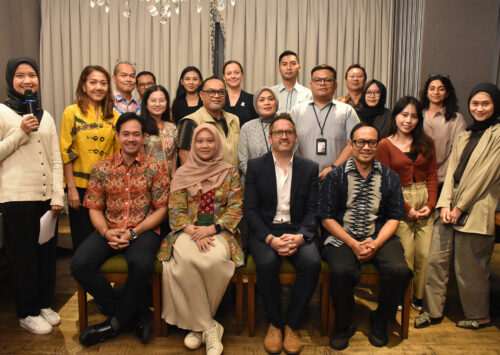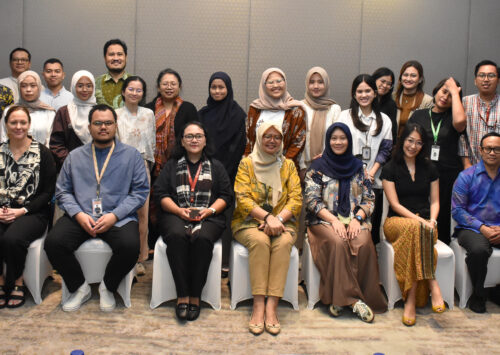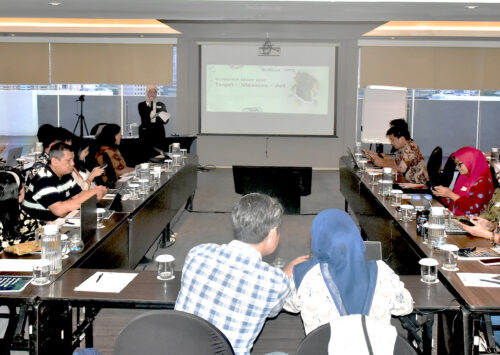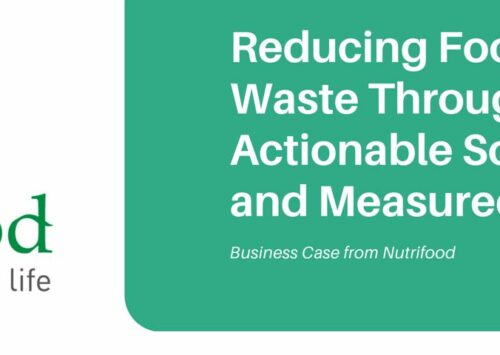Jakarta, July , 2022— The role of food banks during the COVID-19 pandemic has proven to be one of the vanguards in providing access to food to people in need during critical times. Food banks help to alleviate poverty by giving food service supplies for consumption. To encourage multi-stakeholder collaboration in halving food loss and waste and achieving Sustainable Development Goals of Zero Hunger and Responsible Consumption and Production in Indonesia, FoodCycle Indonesia held a “Journey to Sustainable Development through Practical Collaboration with the Food Bank.” at 101 Urban Hotel Thamrin, Central Jakarta.
In her opening speech, Co-founder and CEO of FoodCycle Indonesia, Astrid Paramita, said, “As a food bank that has been established in 2017, FoodCycle Indonesia wants to continue to invite all parties to contribute to the problem of hunger and access to food for the community.”
Indah Budiani, Executive Director of the Indonesian Business Council for Sustainable Development (IBCSD), also added, “Food banks have an important role for businesses in bridging food producers to the public who have excess food to be distributed to those in need.” Cooperation between producers or businesses with food banks can help businesses overcome food loss or food waste problems while also increasing the positive impact.
The remarks were also made by Hidayat Nur Wahid, Member of the Indonesian House of Representatives Commission VIII and Deputy Chair of the MPR RI, who conveyed through a video recording that the DPR is in the process of ratifying the Food Bank Bill for Social Welfare as one of the important legal umbrellas in protecting food bank activities in Indonesia.
“Food banks have proven to be organizations that help the government in realizing food access guarantees for the community, so their presence needs to be protected with legal aspects and legal protection that supports donation activities carried out by food banks,” he said.
Director of Field Services of The Global Food Banking Network, Craig A. Nemitz, mentions that hunger happens in all parts of the world. In general, there is an excess of food and a shortage of food in one city within a very close distance. “A third of the food ever produced to meet human needs has never been eaten. A very astonishing fact. ” He added that he was concerned that the figure had not changed throughout his career in food banking. So the presence of a foodbank is crucial to this problem.
Herman Andryanto, Co-founder of FoodCycle Indonesia, also shared creative collaborations that can be done together with food banks. He gave an example of the unique innovations carried out by various food banks in various countries, such as the Philippines, which uses vacant land for grocery gardens; and Hong Kong, which chooses to cooperate with well-known airlines to donate food.
At the same event, FoodCycle Indonesia also launched the Spicy Marinara Sauce product innovation, which was produced from a surplus of unprocessed tomatoes in the hotel and restaurant industry. There is also a FoodCycle Point, a location that makes it easier for individual donors to donate their food directly to nearby places, or a social media campaign “One Post = One Donation” that can be followed by netizens.
With these creative innovations, we hope that more and more parties, both government and private, will collaborate with food banks to provide access to decent food for people in need and other vulnerable groups.
–FoodCycle Indonesia is a non-profit organization that operates as a food bank and is committed to distributing food aid to underprivileged communities in need. Since 2019, FoodCycle has been registered as a part of the Global FoodBanking Network Asia Incubator Program. To date, FoodCycle has distributed more than 520 tons of food aid and expanded their reach through 80 partners in 12 cities across Indonesia. FoodCycle Indonesia has joined GRASP2030 as an associate signatory.








